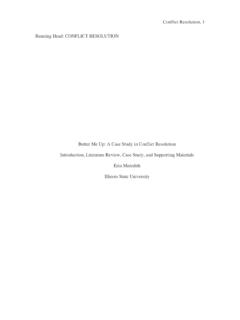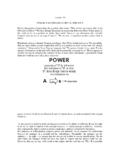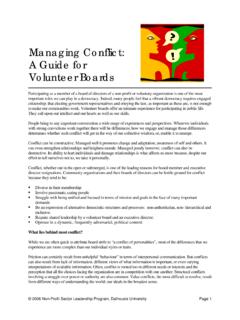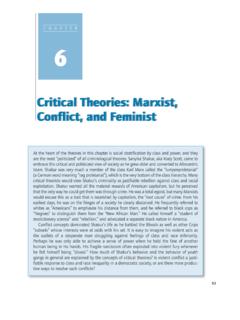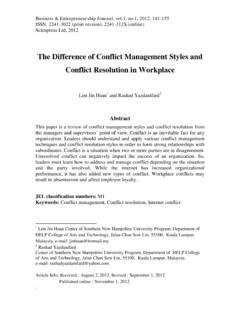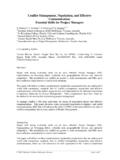Transcription of The Critical Role of Conflict Resolution in Teams: A …
1 The Critical Role of Conflict Resolution in Teams: A Close Look at theLinks Between Conflict Type, Conflict Management Strategies, and TeamOutcomesKristin J. BehfarUniversity of California, IrvineRandall S. PetersonLondon Business SchoolElizabeth A. Mannix and William M. K. TrochimCornell UniversityThis article explores the linkages between strategies for managing different types of Conflict and groupperformance and satisfaction. Results from a qualitative study of 57 autonomous teams suggest thatgroups that improve or maintain top performance over time share 3 Conflict Resolution tendencies: (a)focusing on the content of interpersonal interactions rather than delivery style, (b) explicitly discussingreasons behind any decisions reached in accepting and distributing work assignments, and (c) assigningwork to members who have the relevant task expertise rather than assigning by other common meanssuch as volunteering, default, or convenience.
2 The authors results also suggest that teams that aresuccessful over time are likely to be both proactive in anticipating the need for Conflict Resolution andpluralistic in developing Conflict Resolution strategies that apply to all group :team Conflict , Conflict management, team viabilityA great deal of empirical and theoretical attention has beenfocused in the past decade on intragroup Conflict and its impact onteam performance (see De Dreu & Weingart, 2003, and Jehn &Bendersky, 2003, for reviews). Two recent developments in thisline of research are the impetus for this article. First, the intragroupconflict literature has begun to question the notion that measuringlevels of Conflict by using the tri-partite classification ( , task,relationship, and process Conflict ) will reliably explain group per-formance. For example, a recent meta-analysis has cast doubt onthe usefulness of this classification by questioning the widelytheorized benefits of task Conflict and suggesting that task conflictpredicts similar negative outcomes to relationship Conflict (DeDreu & Weingart, 2003).
3 A number of scholars have also reportednegative and contradictory associations between process conflictand performance ( , Jehn & Mannix, 2001).The second and related development in the group Conflict liter-ature is the move away from the notion that different types ofconflict have a direct impact on performance instead scholars areincreasingly suggesting that various aspects of group process andgroup dynamics serve to ameliorate or exacerbate the impactconflict has on group outcomes generally (see Jehn, 1997, andJehn & Bendersky, 2003, for a review). For example, task conflictin the presence of trust is more likely to result in positive effectsthan where trust is low (Simons & Peterson, 2000). Building onthese developments, we take a closer look at the effects of conflictresolution ( , vs. absolute level of Conflict ). We want to knowhow Conflict Resolution tactics are associated with the impact oftask, relationship, and process conflicts on group outputs, and howdifferent approaches to managing each type of Conflict are asso-ciated with increases versus decreases in team performance.
4 Indoing so, we suggest that the way a team manages its conflicts iscritically important for predicting team viability and over Role of Conflict Management in Predicting TeamOutcomesA number of scholars have argued that Conflict management,and particularly Conflict Resolution , is an important predictor of thegroup and/or dyadic Conflict performance relationship (Jehn &Bendersky, 2003; Marks, Mathieu, & Zaccaro, 2001; Mathieu &Schulze, 2006; Tinsley, 2001; Weingart, 1992; Williams &O Reilly, 1988). In theorizing about this key role for conflictmanagement, previous research suggests that aprocessfor man-aging Conflict can help to reduce the negative impact of all typesof Conflict by restoring fairness, process effectiveness, resourceefficiency, working relationships, and/or satisfaction of parties( , Thomas, 1992). For example, Tjosvold (1991) has arguedthat a cooperative approach to Conflict Resolution allows Conflict ofa variety of types to be resolved in a way that is beneficial to thegroup.
5 The procedural justice literature similarly supports thenotion that a process of Conflict management that allows groups toresolve their conflicts fairly will result in Conflict of all types beingKristin J. Behfar, The Paul Merage School of Business, University ofCalifornia, Irvine; Randall S. Peterson, Organisational Behaviour, LondonBusiness School, London, United Kingdom; Elizabeth A. Mannix, The John-son Graduate School of Management, Cornell University; William M. , Policy Analysis and Management, Cornell concerning this article should be addressed to Kristin , The Paul Merage School of Business, The University of California,Irvine, Irvine, CA 92698. E-mail: of Applied PsychologyCopyright 2008 by the American Psychological Association2008, Vol. 93, No. 1, 170 1880021-9010/08/$ DOI: effectively resolved, leading to more desirable group out-comes. The group value model, for example, posits that individualsbenchmark their status in a group on the basis of how proceduresare applied to them during group process (Lind & Earley, 1992).
6 Team conflicts , whether latent or overt, often manifest themselvesas process-based conflicts in the form of passive-aggressive be-haviors such as power plays, blaming, tardiness, or withholdinginformation (Edelmann, 1993; J. Wall & Callister, 1995). Themanner in which members treat each other while working throughproblems changes expectations for the next group interaction, formember satisfaction with the group (Lind & Tyler, 1988), and formember willingness to continue contributing to the group proac-tively (Jehn, 1997).Moreover, there is also a growing body of evidence to suggestthat, over time, the actions and reactions groups have to pastperformance and evolving group dynamics leave teams prone tosome degree of chronic Conflict , Conflict spirals, and/or rigidity intheir process management (Ancona & Chong, 1996; Arrow, Poole,Henry, Wheelan, & Moreland, 2004; De Dreu & VanVianen,2001; Kuhn & Poole, 2000; Peterson & Behfar, 2003; Rahim,2002).
7 One Critical key to understanding group performance lies inbetter understanding the choices groups make in choosing conflictresolution strategies to deal with this Conflict . These choices arekey to understanding a team s ability to successfully learn andadapt task strategies to meet performance criteria ( , Argyris,1982; Edmondson, 1999). If teams make Conflict resolutionchoices that do not allow the team to resolve Conflict effectively,those teams are likely to be prone to continuous, escalating con-flicts as members spend time reacting to provocative conflictbehaviors of other team members rather than focusing on the taskat hand. Teams that can adapt their processes appropriately, how-ever, are more likely to create teams where members are satisfiedand performance is Conflict management process encompasses a wide range ofactivities, including communication, problem solving, dealingwith emotion, and understanding positions (Brett, 2001; Pondy,1992; Putnam & Poole, 1987).
8 Conflict management behaviorshave primarily been studied either as individual styles that arestable traits of individuals, as types of behaviors (such as threats orcompromises), or as generalized behavioral orientations ( ,avoiding, accommodating, compromising, competing, problemsolving; see Folger, Poole, & Stutman, 2001, for a review of themultiple frameworks). Previous research in this tradition hasshown that different Conflict management orientations ( , col-laborating, competing, accommodating) affect success at the indi-vidual and team levels (Blake & Mouton, 1964; De Dreu, 1997;Morrill & Thomas, 1992; Putnam & Poole, 1987; Rahim, 1983;Ruble & Thomas, 1976). For example, cooperative or collabora-tive orientations increase effectiveness in managing task Conflict (De Dreu, 2006; Tjosvold, Hui, & Yu, 2003). Relationship con-flict, however, is typically described as needing to be manageddifferently, with some studies recommending avoidance of rela-tionship Conflict altogether ( , De Dreu & VanVianen, 2001)and other studies reporting that avoidance orientations increasenegative emotion (Desivilya & Yagil, 2005).
9 The present articlebuilds on this tradition but takes a more fine-grained look atconflict management tactics (as opposed to generalized strategiessuch as cooperation ) by trying to get a better understanding ofthe effects of specific Conflict Resolution strategies on group out-comes. We ask questions such as how do some teams managerelationship Conflict and avoid its usual negative impact, whileothers do not? More specifically, are there particular conflictresolution tactics that allow for the effective Resolution of relation-ship Conflict ? Why does task Conflict manifest itself as construc-tive debate in some teams but as open fighting in other teams? Inother words, are there specific Conflict Resolution tactics that ateam can chose that will allow for effective management of taskconflict? Do certain Conflict Resolution tactics work across alltypes of Conflict ? Or does each type of Conflict require differentconflict Resolution strategies?
10 This Study: Linking Conflict Resolution Strategies WithTeam Performance and Member SatisfactionOur purpose in this study is to examine specific Conflict reso-lution strategies in groups to better understand their potentialeffects on group outcomes ( , performance and satisfaction). Toaccomplish this, we look at teams with consistently high or in-creasing group performance and member satisfaction and consis-tently low or decreasing group performance and member satisfac-tion over time in order to see which Conflict Resolution strategiesare associated with each of three commonly measured conflicttypes: task, relationship, and process Conflict . Task or cognitiveconflict is disagreement over differences in ideas, viewpoints, andopinions pertaining to the group s task (Amason & Sapienza,1997). Relationship Conflict is disagreement resulting from inter-personal incompatibilities, which includes affective componentssuch as feeling tension and friction.

